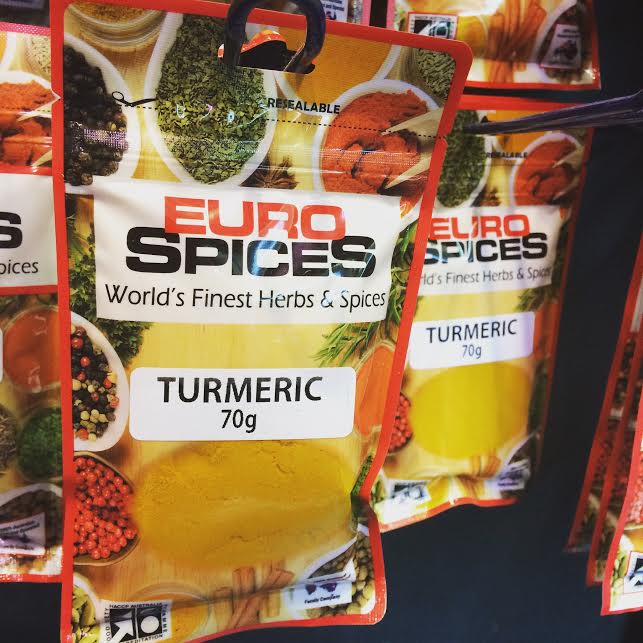The spice I am referring to is turmeric! A spice which has been used for centuries in Asian cooking but until recently has been ignored in western culture. This spice has many nutrition benefits and could be a potential weapon against many inflammatory diseases and skin conditions.
How does turmeric work?
Turmeric contains a chemical called curcumin. This chemical has been linked to decreasing inflammation in the body and as a result may help in conditions like:
- Arthritis
- Skin conditions and sores
- Heartburn
- Stomach pain
- Digestive diseases e.g. Crohn’s Disease, Irritable Bowel Syndrome and Ulcerative Colitis.
- Headaches
- Colds and lung infections
- Urinary bladder inflammation
- Depression
- Alzheimer’s disease
This all sounds amazing but before you dash off to the supermarket and buy all the turmeric you can find what does the evidence say?
It is easy to get caught up in the hype of food industry trying the sell product and the ‘magic pill’ but the smart people (like yourself) choose fact over fad. So, let’s break it down into conditions:
Arthritis
Evidence now is inconclusive, and more research is needed. Bottom line: I would wait and see before using this to decrease arthritis. Enjoy the spice as you would normally but buying it especially to help arthritis may be premature, especially if you don’t like the taste.
Skin conditions and general skin health
Good news here, there is evidence that turmeric taken orally or directly onto the skin may increase skin health. Saying this further study is needed but it may be worth trying out turmeric.
Digestive disorders
Watch this space! There is a strong type of study type currently in progress, but the results have not been released yet, stay tuned!
Colds and lung infections
There are studies which do support the role of turmeric in its ability to help reducing the infections and inflammation in the lungs but as it the trend, more research is needed especially to summarise all the research out there at the moment.
Depression
There are small clinical studies which support the use of turmeric as a treatment for depression, however there is still more research needed to support this in larger based, summary studies and you should always talk to your GP to ask if any medications you are currently taking will interact with turmeric.
Alzheimer’s Disease
Presently, there is not enough studies done on humans to support the use of this as an effective treatment.
Take home message:
More research is needed but the use of turmeric in many conditions looks positive. Give turmeric a go as part of a balanced diet. If you are currently taking any medication such as anticoagulated and nonsteroidal drugs these may have interactions with this spice so always talk to your GP if in doubt. If you use this spice in moderation your risk of side effects from overconsumption like stomach upset or ulcers will be minimal.
References:
- Daily JW, Yang M, Park S. Efficacy of Turmeric Extracts and Curcumin for Alleviating the Symptoms of Joint Arthritis: A Systematic Review and Meta-Analysis of Randomized Clinical Trials. Journal of medicinal food. 2016; 19(8):717-29.
- Vaughn AR, Branum A, Sivamani RK. Effects of Turmeric (Curcuma longa) on Skin Health: A Systematic Review of the Clinical Evidence. Phytotherapy research : PTR. 2016;30(8):1243-64.
- Thavorn, K., Mamdani, M. M., & Straus, S. E. (2014). Efficacy of turmeric in the treatment of digestive disorders: a systematic review and meta-analysis protocol. Systematic Reviews, 3, 71. http://doi.org/10.1186/2046-4053-3-71
- Moghaddam, S. J., Barta, P., Mirabolfathinejad, S. G., Ammar-Aouchiche, Z., Garza, N. T., Vo, T. T., … Dickey, B. F. (2009). Curcumin inhibits COPD-like airway inflammation and lung cancer progression in mice. Carcinogenesis, 30(11), 1949–1956. http://doi.org/10.1093/carcin/bgp229
- Maroon, J. C., Bost, J. W., & Maroon, A. (2010). Natural anti-inflammatory agents for pain relief. Surgical Neurology International, 1, 80. http://doi.org/10.4103/2152-7806.73804
- Natascia Brondino, Simona Re, Annalisa Boldrini, et al., “Curcumin as a Therapeutic Agent in Dementia: A Mini Systematic Review of Human Studies,” The Scientific World Journal, vol. 2014, Article ID 174282, 6 pages, 2014. doi:10.1155/2014/174282








